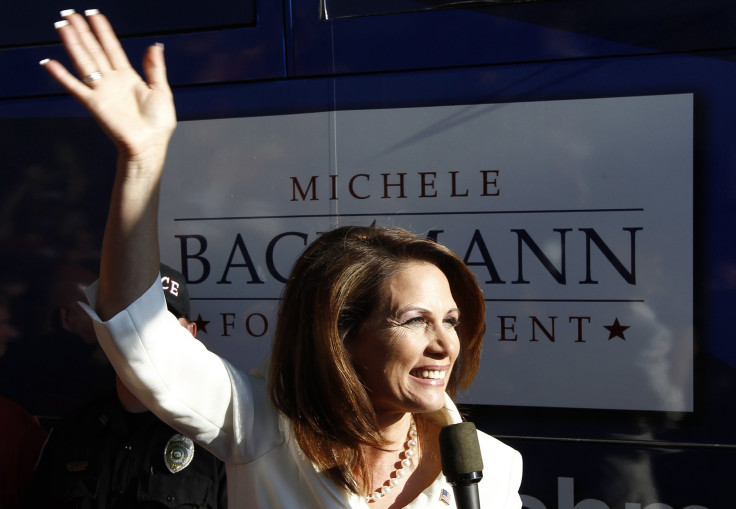Iowa Straw Poll Results 2015: Does GOP Contest Still Matter For Presidential Candidates?

By the time all the votes were counted in the Ames Straw Poll in the summer of 2011, then-Congresswoman Michele Bachmann was riding high. Bachmann took first place in the vote, the first test of support for Republican presidential candidates. But whatever momentum or positive press coverage Bachmann received from the win in the unscientific poll, it didn’t last long enough. Five months later, she finished sixth in the Iowa caucuses and dropped out of the presidential race.
In August, a carnival-like atmosphere will once again enshroud Iowa for the ritual straw poll, which also serves as a fundraiser for the Iowa Republican Party. Candidates traditionally set up tents and offer food for the thousands of Iowans expected to attend the event. But of the handful of Republicans weighing a 2016 presidential run, former Florida Gov. Jeb Bush has already decided to skip the straw poll, being held this year in Boone, Iowa, and only Sen. Ted Cruz, R-Texas, and retired neurosurgeon Ben Carson have indicated they will participate, according to Politico. The potential poor showing among GOP presidential contenders has raised questions about the future of the Iowa vote and whether it will matter at all in 2016.
“I think two words explain why, and that’s 'Michele Bachmann,' ” said Marc Hetherington, a political science professor at Vanderbilt University in Nashville, about the reluctance of GOP candidates to compete in the straw poll this year. “In terms of winners and losers, it doesn’t matter at all. And increasingly it appears anyway on the Republican side that Iowa matters less and less” in 2016, because the white, evangelical voters that dominate the state aren’t representative of Republican voters overall, he said.
Iowa GOP spokesman Charlie Szold shot down the idea that this year’s straw poll will have diminished influence, pointing out that frontrunner John McCain skipped the event in 2007, as did frontrunner Mitt Romney in 2011. “It’s not out of the norm for people not to be jumping in [with] both feet forward. Everything is as it has been. It’s a very normal straw poll cycle right now,” he said, adding that candidates beyond Cruz and Carson are “definitely interested,” although he declined to name them or say how many candidates had signaled they would participate.
“I think that it’s a fantastic opportunity to meet 20,000 to 30,000 Iowa Republicans,” Szold said. “This event is incredibly popular with the grassroots here. It’s been a favorite for decades -- people look forward to it literally for years between election cycles.”
The Iowa contest was first held in 1979. Since then, only three times has a candidate won the straw poll and followed that up with a win in the caucuses: George H.W. Bush in 1979 and 1980, Bob Dole in 1995 and 1996, and George W. Bush in 1999 and 2000. Only George W. Bush has gone on to win the straw poll, the caucus and the presidency.
Straw poll voters have to pay for tickets to vote, $30 each this year, although the campaigns pay for their supporters. The campaigns also pay for transportation to bring their backers to the event. There was controversy over whether to hold the event this year at all, with Iowa Gov. Terry Branstad, a Republican, among those saying that he believed the event “has outlived its usefulness,” according to the Washington Post. He later reversed course after the Iowa Republican Party voted in January to move forward with the seventh straw poll, albeit with changes, including no longer having candidates bid for the biggest tent space and lowering the ticket prices by $5 from 2011.
Szold said while the Iowa GOP doesn’t proclaim the straw poll to be indicative of caucus support, he said the event still serves a function of gauging organizational strength of the campaigns and helps them lay the groundwork for the caucuses in February. It also helped winnow the field in 2011, when Tim Pawlenty, then governor of neighboring Minnesota, dropped out after a poor showing in the straw poll.
“The key to doing well is still buying a lot of tickets, handing them out to supporters and getting them to the venue, so it’s never really shown a depth of support, particularly across the state, since most Republicans who are not being bused in by a candidate, if they live far enough away, they’re not going to come,” said Arthur Sanders, a political science professor at Drake University in Des Moines, Iowa.
Establishment candidates like Bush have more to lose by competing in the straw poll and doing poorly than by skipping the contest. By passing on it, they deflect themselves from harsh media coverage pointing out how they didn’t live up to expectations, according to Sanders.
“If Iowa wasn’t the first-in-the-nation caucus, nobody would pay any attention to the straw poll. Because everybody’s interested in how everyone’s going to do in Iowa, this looks like a test of how people might do in Iowa,” Sanders said. “But it becomes a pseudo-test and what the test is: ‘Can I do well enough to get some good articles in the newspapers about me, maybe get mentioned on the evening newscast as the surprise person?’” he said.
Donna Hoffman, department head and associate political science professor at the University of Northern Iowa, said the straw poll is “not insignificant” in that it is a gauge of enthusiasm for candidates and a proxy for the organization level in the state, but the poll itself is “not representative of virtually anything.”
“The straw poll perhaps has outlived its usefulness, but I think the Republican Party of Iowa wants to give it one more try … to see that it’s something that they want to go forward,” she said.
© Copyright IBTimes 2025. All rights reserved.






















